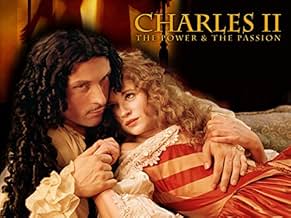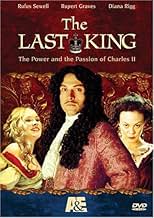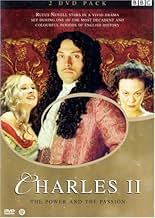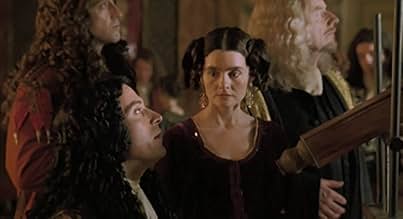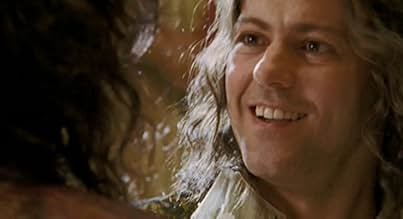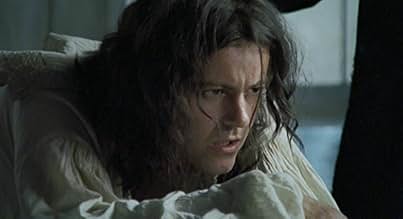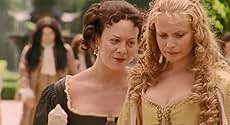CALIFICACIÓN DE IMDb
7.5/10
1.9 k
TU CALIFICACIÓN
La crónica de la época de Carlos II en el trono, sus diez años de exilio de la Inglaterra de Oliver Cromwell y su regreso triunfal.La crónica de la época de Carlos II en el trono, sus diez años de exilio de la Inglaterra de Oliver Cromwell y su regreso triunfal.La crónica de la época de Carlos II en el trono, sus diez años de exilio de la Inglaterra de Oliver Cromwell y su regreso triunfal.
- Nominado a 1 premio Primetime Emmy
- 4 premios ganados y 10 nominaciones en total
Explorar episodios
Opiniones destacadas
5-628
You cannot help but be impressed by the production values of this potentially great BBC series. However, the scenes jump quickly, characters come and go quickly and overall the story is hard to follow unless you read up on the history of the reign of Charles II. Either the editing has been so severe that the continuity has been damaged or the producers have assumed that viewers are fully aware of the history. Either way, a narrative would have helped to fill in the considerable gaps.
That said, the sets are impressive and the acting is first-class. With better continuity, this could have been an impressive tele-movie. In the form that it was presented on TV, it just misses the mark unless you already know your history.
That said, the sets are impressive and the acting is first-class. With better continuity, this could have been an impressive tele-movie. In the form that it was presented on TV, it just misses the mark unless you already know your history.
7=G=
"The Last King" is a 3 hour, two part miniseries from the BBC which traces the life of King Charles II who ruled from 1649 until his death in 1685. The upside of this film includes its sumptuous appointments and excellent cast. Well directed and crafted, the film is engaging, passionate, and delivers a strong sense of Charles II, his Monarchy, and the period. On the downside, however, the film is very difficult to follow given the absence of any prologue or didactics, the mixing of sir names and titles, and the presumption of some knowledge of the history of the time. The film squanders time on the sexual intrigues and personal relationships of the womanizing King while largely ignoring the more historical and profound matters of state. The Dutch Wars, for example, are barley mentioned while much time is spent on the machinations of one of his mistresses, Barbara Villiers making the film a bit more of a soap opera than a historical chronicle. Nonetheless, this elegant film is a must see for anyone interested in King Charles II and a should see for those into stories of the history of England's monarchy. No one does English period films better than the Brits and this one has production value equal to any similar films from Hollywood. (Note - the DVD I watched has no CC's or Subtitles with much dialogue spoken in whispers or thick English, French, of Portuguese accents). B
Charles II was the most unique king in English History. At the dawn of democracy, his father was executed by Puritan reformers in a great Civil War, and as a result young Charles had a misspent youth like that of any common criminal -- years on the run, a price on his head, living in taverns with low companions and learning to beg and borrow from other kings. Learning to disguise his emotions and trust in no-one, yet also learning to enjoy pleasure as the one sure comfort in life.
Rufus Sewell does an amazing job playing this complex, bitter, loving man, forever both sad and playful, the most notorious yet somehow most mysterious English king. The story covers all of his reign, from 1660 to 1685, and shows not only his relationships with his subjects, counselors, and family, but with the many passionate, demanding, and thoroughly bewitching royal mistresses who filled his days with glamor and amusement and his nights with excitement and pleasure. They range from the wickedly uninhibited, scheming and unscrupulous Barbara Villiers, to the cheerful, fun-loving Nell Gwynn, to the sweet and childlike Louise DeKeroualle. Last but not least, there is the king's own lawful wife, Catherine of Braganza, an extraordinarily resilient and caring woman who changes over the years from being a pitiful foreign outsider at the English court to being a beloved and respected companion of the king.
I have been reading about these fascinating historical personalities for years, and I have to say that by and large the movie captures all of them perfectly. There were moments so right they took my breath away -- the stupid, bigoted Duke of York flying into a religious tirade at the worst possible moment, for example. Or the weak-willed, feeble young Duke of Monmouth, Charles' doomed bastard son, being coaxed into the arms of Barbara Villiers one moment, and into treasonous plots the next, the handsome royal bastard no more than a fly caught in a web of pleasure and power. Or even the very brief scene of Charles' gentle and warm-hearted sister, trapped in a loveless marriage to a French nobleman, being consoled by the greatest king of all -- Louis XIV.
Of course, there were some interpretations I didn't like so much. Diana Rigg was wonderful as the king's fiery French mother, Henrietta Marie, but I think the writers exaggerate her vindictive, bitter attitude, and ignore her loyalty to her husband and son. In real life Henrietta Marie was not just a harpy shrieking for vengeance. She adored her son and took a very indulgent view of his pleasures at court. In her last years, the real Henrietta Marie was more likely to be found playing cards or going on shopping sprees or even indulging in love affairs with much younger men, rather than screaming for more executions and blood.
By the same token, the stunningly beautiful Melanie Thierry turns in an adorable performance as Madame Louise, Charles' passionate and very enthusiastic young French mistress. The real Louise was every bit as innocent and eager to bed King Charles as the film suggests. However young she was, however, Louise was no fool. She didn't need any coaching from the queen on how to look after the king. She made him so comfortable that she remained the favorite mistress until the day he died. Far from being a flighty scatterbrain, she was probably the most sensible and intelligent of the royal mistresses.
The film version ignores all this entirely, showing Louise as a clueless blonde with the mentality of a six year old. The real Louise was dark, with lustrous black hair and a pleasingly rounded figure that grew increasingly plump across the years. But it's most unlikely that Queen Catherine ever had to sit her down and lecture her on the right way to mother Charles. More likely it was the other way around, for the queen herself always referred to Louise as a "kind friend" and in fact often used to go to Louise for comfort and advice when she was feeling low and dejected in her later years.
In the last few years many saw Louise as almost something of a queen in her own right, able to dispense great wisdom while making the careers of many statesmen. When Charles was dying, she was the one who held his hand to the end (while Queen Catherine was rubbing his feet) and she also made sure he had a priest to confess to, since in his heart he had always been a loyal Catholic. It's a shame none of Louise's deeper shrewdness and strength comes across in the final segment of the film.
Yet on so many levels this movie is a masterpiece. THE POWER AND THE PASSSION tells the amazing true story of England's King Charles II with flair and style.
Rufus Sewell does an amazing job playing this complex, bitter, loving man, forever both sad and playful, the most notorious yet somehow most mysterious English king. The story covers all of his reign, from 1660 to 1685, and shows not only his relationships with his subjects, counselors, and family, but with the many passionate, demanding, and thoroughly bewitching royal mistresses who filled his days with glamor and amusement and his nights with excitement and pleasure. They range from the wickedly uninhibited, scheming and unscrupulous Barbara Villiers, to the cheerful, fun-loving Nell Gwynn, to the sweet and childlike Louise DeKeroualle. Last but not least, there is the king's own lawful wife, Catherine of Braganza, an extraordinarily resilient and caring woman who changes over the years from being a pitiful foreign outsider at the English court to being a beloved and respected companion of the king.
I have been reading about these fascinating historical personalities for years, and I have to say that by and large the movie captures all of them perfectly. There were moments so right they took my breath away -- the stupid, bigoted Duke of York flying into a religious tirade at the worst possible moment, for example. Or the weak-willed, feeble young Duke of Monmouth, Charles' doomed bastard son, being coaxed into the arms of Barbara Villiers one moment, and into treasonous plots the next, the handsome royal bastard no more than a fly caught in a web of pleasure and power. Or even the very brief scene of Charles' gentle and warm-hearted sister, trapped in a loveless marriage to a French nobleman, being consoled by the greatest king of all -- Louis XIV.
Of course, there were some interpretations I didn't like so much. Diana Rigg was wonderful as the king's fiery French mother, Henrietta Marie, but I think the writers exaggerate her vindictive, bitter attitude, and ignore her loyalty to her husband and son. In real life Henrietta Marie was not just a harpy shrieking for vengeance. She adored her son and took a very indulgent view of his pleasures at court. In her last years, the real Henrietta Marie was more likely to be found playing cards or going on shopping sprees or even indulging in love affairs with much younger men, rather than screaming for more executions and blood.
By the same token, the stunningly beautiful Melanie Thierry turns in an adorable performance as Madame Louise, Charles' passionate and very enthusiastic young French mistress. The real Louise was every bit as innocent and eager to bed King Charles as the film suggests. However young she was, however, Louise was no fool. She didn't need any coaching from the queen on how to look after the king. She made him so comfortable that she remained the favorite mistress until the day he died. Far from being a flighty scatterbrain, she was probably the most sensible and intelligent of the royal mistresses.
The film version ignores all this entirely, showing Louise as a clueless blonde with the mentality of a six year old. The real Louise was dark, with lustrous black hair and a pleasingly rounded figure that grew increasingly plump across the years. But it's most unlikely that Queen Catherine ever had to sit her down and lecture her on the right way to mother Charles. More likely it was the other way around, for the queen herself always referred to Louise as a "kind friend" and in fact often used to go to Louise for comfort and advice when she was feeling low and dejected in her later years.
In the last few years many saw Louise as almost something of a queen in her own right, able to dispense great wisdom while making the careers of many statesmen. When Charles was dying, she was the one who held his hand to the end (while Queen Catherine was rubbing his feet) and she also made sure he had a priest to confess to, since in his heart he had always been a loyal Catholic. It's a shame none of Louise's deeper shrewdness and strength comes across in the final segment of the film.
Yet on so many levels this movie is a masterpiece. THE POWER AND THE PASSSION tells the amazing true story of England's King Charles II with flair and style.
Wow mark you could at least have come up with your own comment instead of ripping off comments from the newsnight discussion on the BBC web site. Did you watch it yourself or did you have someone do that for you as well? For myself I thought this was superb; well acted and scripted if a little prone to use audience capturing doses of sex (almost certainly included to justify it's Saturday night television slot rather than as any particular desire of the director).
The tracking shot at the end as they walk around the lake was especially well crafted and was for me the perfect way of ending the story as they chose to tell it.
The tracking shot at the end as they walk around the lake was especially well crafted and was for me the perfect way of ending the story as they chose to tell it.
Not too sure what the previous reviewer was watching.
Apart from the mildly irritating liberties the writer took with historical accuracy here and there, this is one of the best historical series I've seen for a long time and kept me intrigued for all four episodes. Perhaps the approach was too subtle for some, we had one or two small bits of gore, you could say just enough to convey the brutality of the era.
This however was more about the contradictory elements of Charles's character and how he chose to deal with the constant political threats he lived through which could have swallowed him up at any time. His compassion, tolerance,lust, his fine political judgement, his mixed feelings as he tried to stabilize his country, promote religious tolerance, resist parliament, balance the books and have a good time when he could. The principal players dance around him but do they control him or is he carefully playing them off? It is not about battles, blood or explosive action. It is nevertheless tense and dynamic as friendships, loyalties and political passions spark off each other.
And then, we have Rufus Sewell, seldom has more skilled and effective portrayal of an historical figure been offered. He burns, he frets, he soothes, he controls, he accedes. He acting of great loyalty against all pressures to some and abandonment of allies for political expediency with others, is performed with equally high credibility. He has more character in a few facial movements than many actors could deliver in a hundred lines. A complete and consummate character performance and assimilation of Charles II's persona. The other cast do not fail to provide full but studied portrayals to complete the drama.
The thoughtful mix of setting, inside and out and usual top quality costume etc do not let the production fall below the highest standards. Yet there is no over the top kitch clichéd stuff that many period dramas throw in.
Watch out for any award for Rufus Sewell.
A huge success.
Apart from the mildly irritating liberties the writer took with historical accuracy here and there, this is one of the best historical series I've seen for a long time and kept me intrigued for all four episodes. Perhaps the approach was too subtle for some, we had one or two small bits of gore, you could say just enough to convey the brutality of the era.
This however was more about the contradictory elements of Charles's character and how he chose to deal with the constant political threats he lived through which could have swallowed him up at any time. His compassion, tolerance,lust, his fine political judgement, his mixed feelings as he tried to stabilize his country, promote religious tolerance, resist parliament, balance the books and have a good time when he could. The principal players dance around him but do they control him or is he carefully playing them off? It is not about battles, blood or explosive action. It is nevertheless tense and dynamic as friendships, loyalties and political passions spark off each other.
And then, we have Rufus Sewell, seldom has more skilled and effective portrayal of an historical figure been offered. He burns, he frets, he soothes, he controls, he accedes. He acting of great loyalty against all pressures to some and abandonment of allies for political expediency with others, is performed with equally high credibility. He has more character in a few facial movements than many actors could deliver in a hundred lines. A complete and consummate character performance and assimilation of Charles II's persona. The other cast do not fail to provide full but studied portrayals to complete the drama.
The thoughtful mix of setting, inside and out and usual top quality costume etc do not let the production fall below the highest standards. Yet there is no over the top kitch clichéd stuff that many period dramas throw in.
Watch out for any award for Rufus Sewell.
A huge success.
¿Sabías que…?
- TriviaShirley Henderson's elaborate hairstyle for Catherine's arrival initially took two hours to create.
- ErroresJust before the sequence concerning the smallpox epidemic, we get a brief look at The King's upper right arm and can clearly see a smallpox vaccination scar.
- Citas
Nell Gwynn: [after being mistaken for Charles' Catholic mistress Louise de Kéroualle] Good people, you are mistaken; I am the Protestant whore.
- Versiones alternativasThe version shown in UK was titled "Charles II: The Power & The Passion" and its original running time is 235 minutes. It was broadcast on TV by BBC in four parts, as it is also on the UK DVD distributed by BBC. The longer UK version has also been released in many European countries (Finland, Netherlands and more) and Australia. The version shown in USA on A&E was titled "The Last King" and has a running time on 188 minutes, cutting it down by almost 40 minutes. The DVD released by A&E in USA is the shorter version.
- ConexionesReferenced in The Making of 'Charles II' (2003)
Selecciones populares
Inicia sesión para calificar y agrega a la lista de videos para obtener recomendaciones personalizadas
- How many seasons does The Last King have?Con tecnología de Alexa
Detalles
- Fecha de lanzamiento
- Países de origen
- Sitio oficial
- Idiomas
- También se conoce como
- The Last King
- Locaciones de filmación
- Productoras
- Ver más créditos de la compañía en IMDbPro
Contribuir a esta página
Sugiere una edición o agrega el contenido que falta


